Debunking Data Science Myths: What They Tell You Vs Reality
Big Data
5 MIN READ
May 6, 2022
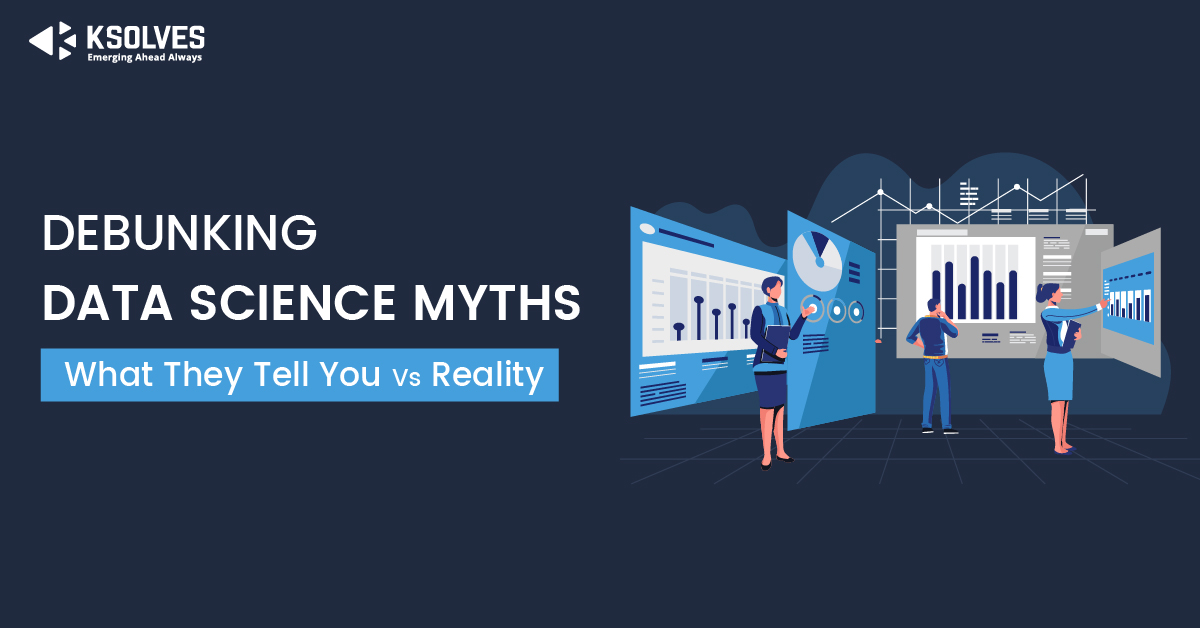
Today, we have high-speed networks at your tip. The volume of information we come across on a daily basis via various sources is enormous. However, everything that glitters is not gold and the reality is that the information which comes across to us most of the time has a lot of clutter added to it. The most worrisome fact is that people easily believe several sources of information blindly without verifying whether the source is trustworthy or not. In a quest to get success, most people use nancy words which are totally unrelated to the topic. These buzzwords are often used to attract people towards the information or to be honest misinformation. This often creates confusion among readers.
One of the fields that are most affected by this in recent times is data science. As data science is evolving, it has become the most demanding field, which of course is a good thing in many ways. But, while some may have developed a great understanding of what data science is capable of, few of them are still confused about the entire process. Data science is now surrounded by a lot of misconceptions and myths. Ksolves’ data science consulting services, do not feed on these myths and want to debunk myths of data science.
This blog addresses certain misunderstandings both individuals and companies have about data science. But, before we bust the misconceptions, let us first understand the concept of data science.
What is Data science?
In this era where enormous data is generated at an unstoppable speed every day, storing and processing it has become a major challenge for most of the industries. Turns out, the concept of Data Science is a perfect solution to this.
Data science refers to the domain of study that deals with large volumes of data using modern tools and techniques. Data science uses complex machine learning algorithms to build predictive models.
Data science includes some of the hottest technologies of recent times such as machine learning, artificial intelligence, data analytics, and data visualization. Data science is basically a process and starts with hypotheses. The data is later gathered to achieve valuable insights.
Once you have collected the data, you can test the hypotheses and build models. The final results are analyzed and sent as a report for decision making. Certain models are used to make valuable decisions. Well, to be honest, you cannot define data science with one single definition. Most data scientists describe it as a process. Modeling and analytics are considered as the subsets of data science.
The best part is, businesses can choose how they want to implement data science in their business. How you implement it depends on various factors like expertise, tools, and data available to the organization. Our data science consulting services act as a catalyst for your organizational goals and what all you need from your data.
Let us now move towards our next segment of debunking data science misconceptions.
Data Analytics Debunked: Myths vs Reality
Let’s take down some of the notions so that you can have a better understanding and a much clear picture of what data science is. Here are some of the misconceptions that are absolutely wrong and need to be busted-
1.Its extremely challenging to find data scientists
There is a theory in the media about the shortage of data scientists. Many companies today are looking for “real” data scientists or “unicorns.” For the unversed unicorns are people who have a graduate degree in math or statistics, strong programming skills, and solid domain expertise. Only a few of the candidates have deep and thorough expertise in all three areas, and hence there is a shortage of data scientists. To overcome these hurdles, many organizations are focusing on developing a data science practice to combine the expertise of various people.
However, in reality this is not completely true. The common mistake that organizations make is they look for people for specialized expertise even if it’s not necessary. The reason is that most companies believe they need experts to gain competitive advantage, although they remain confused about what the person should do. It is quite evident that hiring a specialist is easier than keeping it as a person without a purpose will most likely resign when they receive a better opportunity.
2. Data science is more suited for large organizations
It is understood that large organizations generally have all the financial resources necessary to build a formal data science practice. However, that does not mean that they will be successful.
When these large organizations become successful, a lot is written about them and they are presented as an example of what companies can achieve while competing more effectively, improving operational efficiency, and even disrupting an entire industry. The notion is that large companies or brands are often positioned as the leaders of their industries. And as a reason several small and medium businesses lack confidence and are forced to believe that data science requires hefty investments, expensive software and the world-class expertise to get implemented.
But, it is indeed one of the myths of data science. In fact, data science does not need any of this. Expensive and vast resources do not guarantee success in the field of data science. Organizations of all sizes (be it medium or small) can and have succeeded in the field of data science, if they are implemented correctly by a competent and sound team.
3. Data science won’t last long
This is by far the most common data science misconception. People believe that data science is a term being heavily used in recent times and many tend to forget that although it is a recently coined term, data science is the result of decades of research and innovation in statistical methodologies and tools. Back in the day, When there were no data scientists, statisticians and economists used terms such as ‘data fishing’ or ‘data dredging’. People weren’t much familiar with data mining either.
There has been an exponential rise in the amount of data being generated every minute. The urge and necessity to understand this information and utilize it in the right way led to an increase in the demand for data science. And now with Big Data and the Internet of Things gaining pace, the rate of data generation has increased by many folds. So, data science is no fad, it is here to stay for longer than you think.
4. Complex models are better than simple models
Being a data science consulting service, Ksolves knows that people often talk more about complex models and how good they are as compared to simple models. However, it is not true.
We know that decision trees, statistical regression, and linear regression are not new and hence given very less attention as compared to deep learning and neural networks. Deep learning and neural networks use complex models that are said to be more sophisticated. However, data science is not all about building models and machine learning. This theory of building complex models is also one of the machine-learning misconceptions in the field of data science.
Complex models are not necessarily better than simpler models. First, a complex model can be less efficient than a simpler model if the problem is simple. Second, complex models are costly when it comes to processing power. Complex models can lead to black-box approaches that are impossible to explain. You may argue that a black-box solution may be good, however, they don’t allow users to explore how a result was derived.
On the other hand, simple models are much easier to understand. It is better to always have a little understanding before going towards a certain type of model building.
5. Data science tools are expensive as anything
There is no doubt that some of the most high-rated data science products are extremely expensive to buy and hard to use. However, you do not have to invest millions of dollars in software to gain benefit from data science and utilize it to the fullest.
There are many open-source tools, such as R and Apache Spark, that are simpler to set up and use. Also, there are also a lot of commercial support options that are easily available for such tools.
The commercial products that are available are far less expensive and easy to use as compared to other traditional solutions.
You can take advantage of data science without having to dig holes in your pocket.
6. Data science is complicated and extremely hard to adopt
Data science is believed to be very complicated as it is said to have complex coding which requires different tools. However, this doesn’t have to be the case every time. Data science is more than just complex coding and includes more understanding and solving problems.
Remember to start simple and then go for expanding your capabilities. For many organizations, the path is simple. They start by processing data they think is valuable, getting some insights from it, and sending it to the decision-makers via reports and dashboards. Later, they start with building models on top of the data to drive new and valued insights.
Although there is no one to drive a successful data science adoption, people generally overcomplicate the problem when a simpler, elegant, effective, and cost-efficient solution is available.
Conclusion
In this data analytics debunked bog, we have covered many myths that needed to be busted, however, there are still many data science misconceptions doing rounds in the market. People must understand the fact that they need to recognize and be aware of the myths to gain maximum benefit from data science. Because of all these misconceptions, many people lose confidence and quit before they even start on their data science journey. Ksolves is one of the leading data science consulting services in the global market. If you are looking for more information on data science, please feel free to connect to us or write your queries in the comment section below.

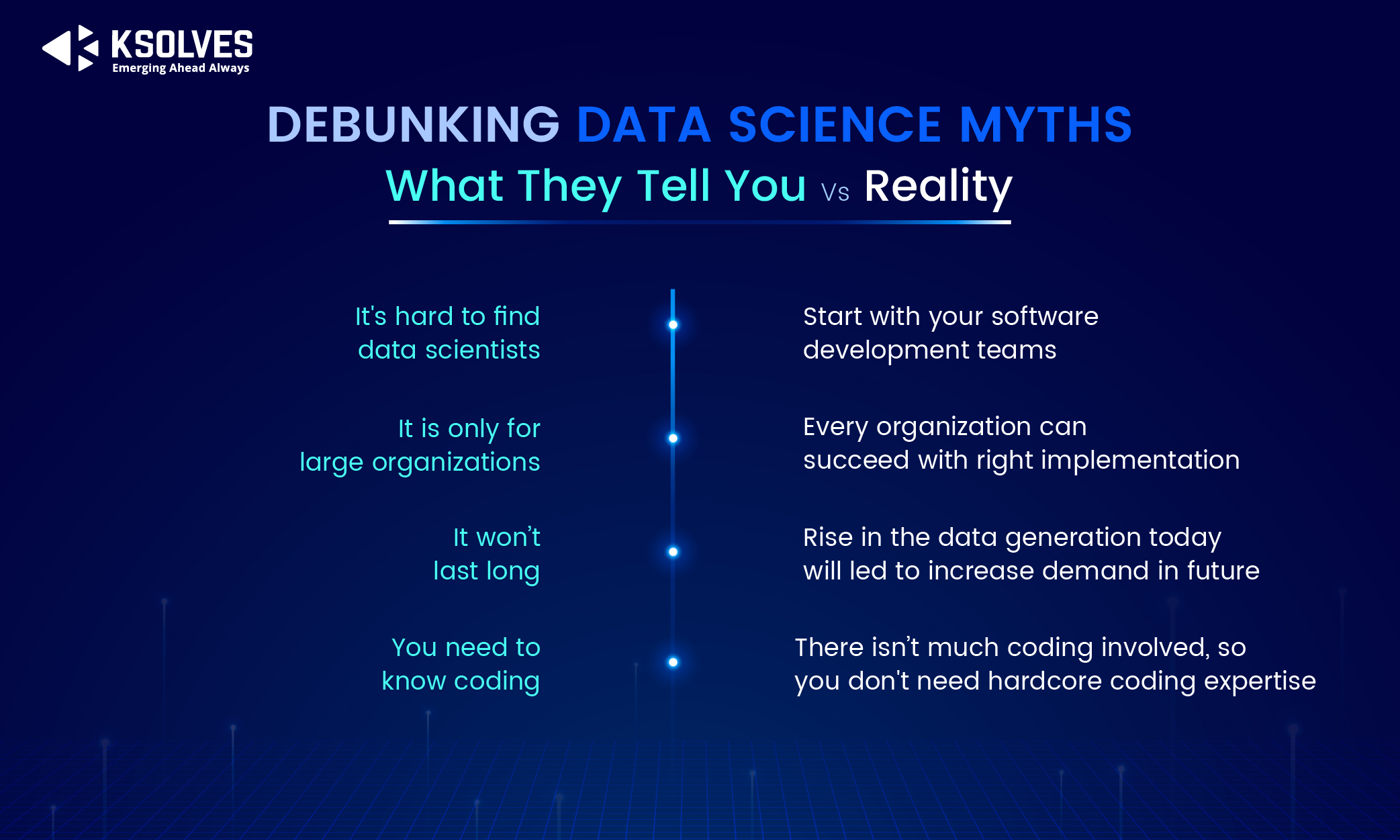
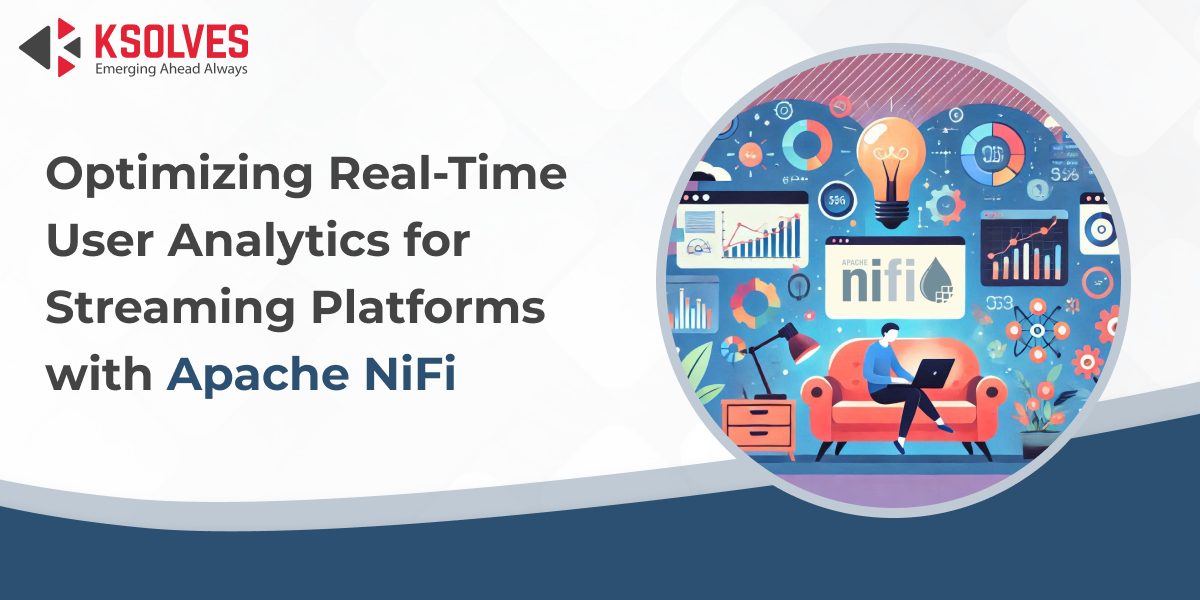
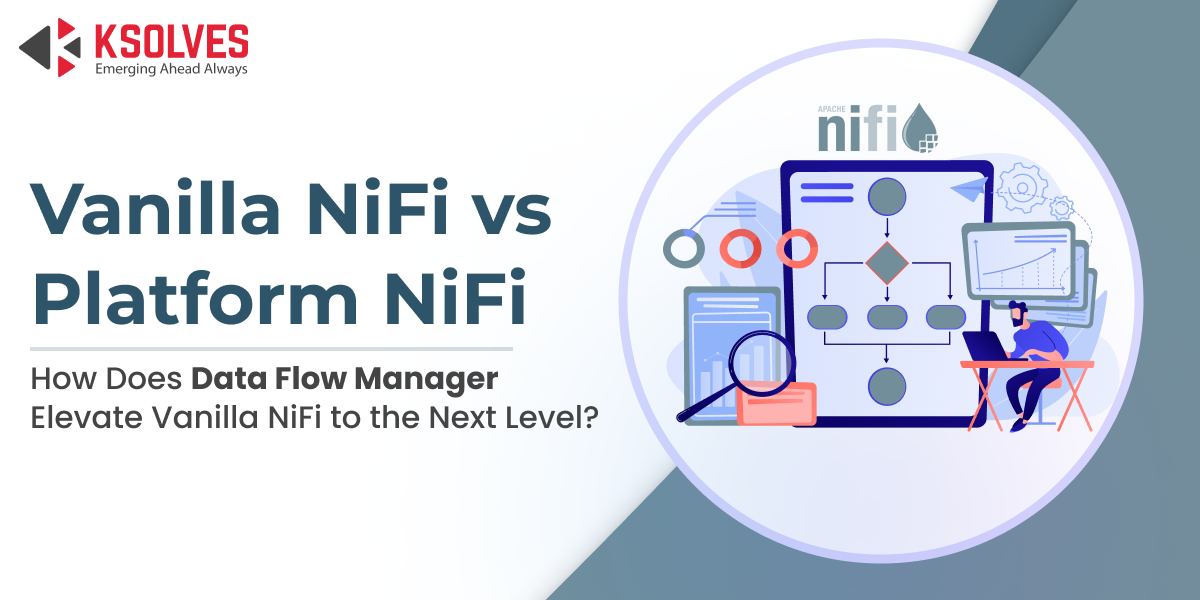
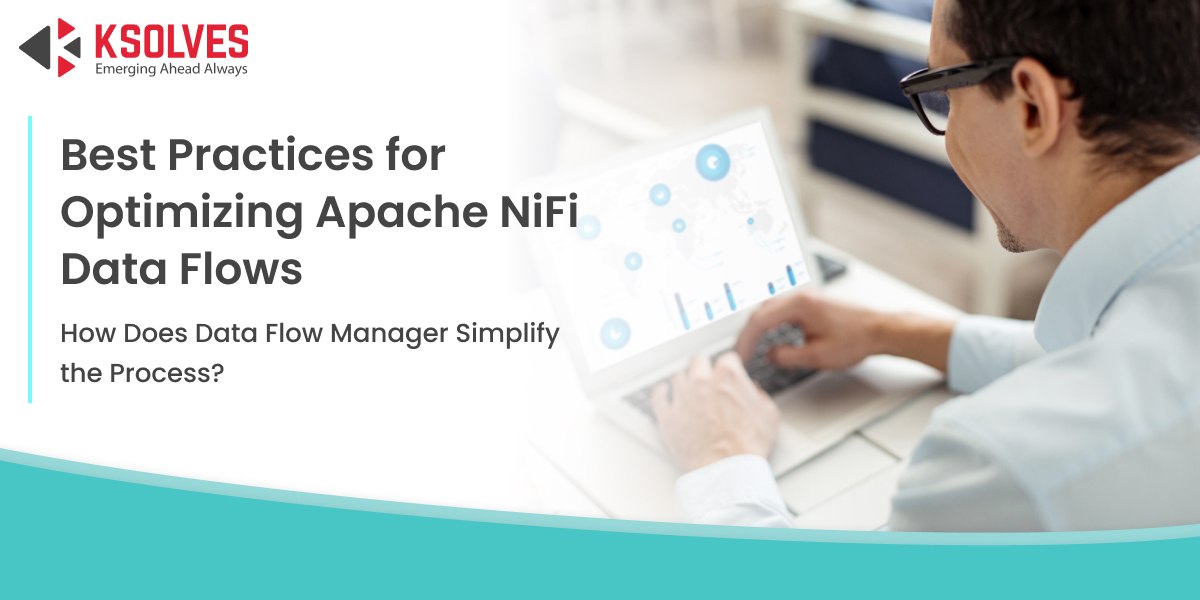

AUTHOR
Big Data
Anil Kushwaha, Technology Head at Ksolves, is an expert in Big Data and AI/ML. With over 11 years at Ksolves, he has been pivotal in driving innovative, high-volume data solutions with technologies like Nifi, Cassandra, Spark, Hadoop, etc. Passionate about advancing tech, he ensures smooth data warehousing for client success through tailored, cutting-edge strategies.
Share with